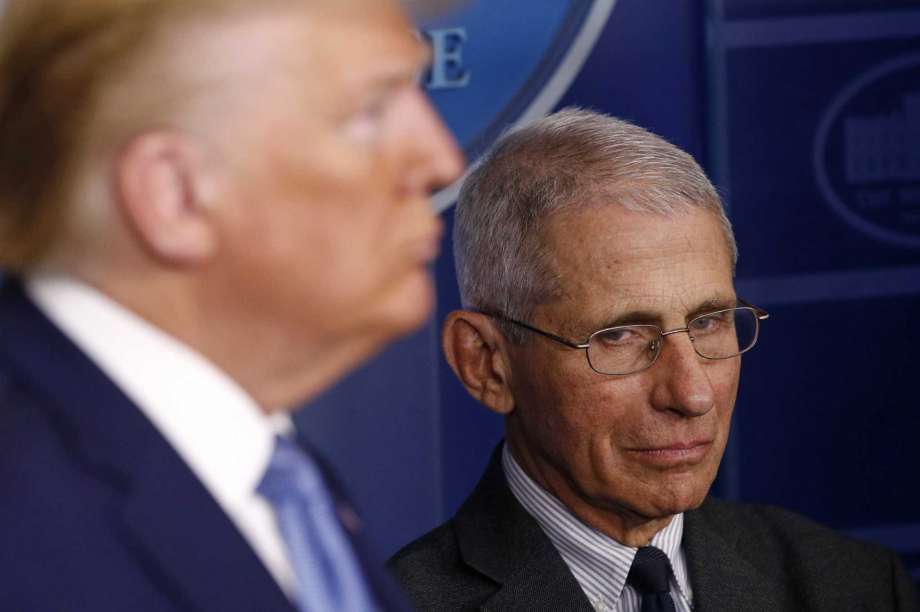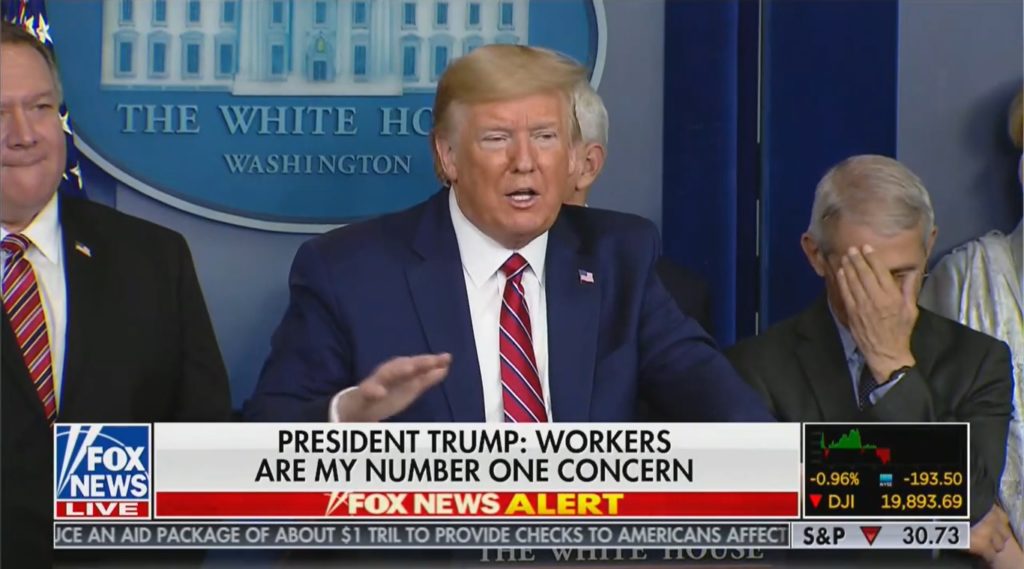Dr. Anthony Fauci’s interview with Science magazine began on an inauspicious note. Asked how he’s doing right now, Fauci said he was “exhausted” but “good.”

“I mean, I’m not, to my knowledge, coronavirus-infected,” he said, before adding with a laugh: “To my knowledge, I haven’t been fired.”
The half-joke was a sign of things to come. What followed were several exchanges that should help people take stock of President Donald Trump’s response to the coronavirus. Repeatedly, Fauci tacitly and even openly admitted that comments made by the commander in chief are not true and are not in line with what the nation’s leading infectious disease expert is advising.
In short, it’s precisely what the critical coverage of Trump has been saying for weeks, but that Trump’s many and ardent defenders have applied blinders on themselves to ignore.
The interviewer, Jon Cohen, asked whether Fauci would acknowledge that Trump says things he disagrees with, and Fauci seemed to grant the premise – albeit diplomatically. Fauci maintained that, “I don’t disagree on the substance” – with “on the substance” being the key phrase – but then added: “It is expressed in a way that I would not express it, because it could lead to some misunderstanding about what the facts are about a given subject.”
If we’re going to distill that down, he’s essentially saying the president is confusing people – at the bare minimum. The exchange highlights the mixed messages the country has been getting in recent days, in particular, about the promise of certain drugs to treat coronavirus. While Fauci has warned that evidence of the drugs’ effectiveness is “anecdotal” and that there is no “magic drug” to treat coronavirus, Trump said Friday that he “disagreed” with Fauci, at least in part, and has repeatedly hailed a malaria drug in particular as a possible “game-changer.” He on Saturday tweeted about the drugs and said he hoped they would be put to use “IMMEDIATELY.”

Asked about the White House holding crowded events like a Rose Garden news conference in which Trump was shaking hands with people, Fauci admitted he has repeatedly advised against it.
“I keep saying, is there any way we can get a virtual news conference. Thus far, no,” Fauci said. “But when you’re dealing with the White House, sometimes you have to say things one, two, three, four times, and then it happens. So I’m going to keep pushing.”
Pressed on the inappropriateness of the events again, Fauci began to show signs of exasperation.
“I know that,” he said. “I’m trying my best. I cannot do the impossible.”
So . . . what’s impossible? Getting the White House to change how it handles public events?
That apparent exasperation bled into the next question, in which Cohen pressed Fauci on Trump’s claim that the response would have been better “if we had known about this a number of months earlier.” (China has indeed been criticized for not alerting the world sooner, but The Washington Post reported this week that U.S. intelligence officials were warning about a likely pandemic as far back as January.)
When Cohen noted Trump’s timeline “just doesn’t comport with facts,” Fauci agreed.
“I know, but what do you want me to do?” Fauci said. “I mean, seriously Jon, let’s get real: what do you want me to do?”
He then said he had tried to get Trump to stop saying that but suggested he can’t correct him in real time at these events.
“I told the appropriate people, it doesn’t comport, because two or three months earlier would have been September,” Fauci said. “The next time they sit down with him and talk about what he’s going to say, they will say, by the way, Mr. President, be careful about this and don’t say that. But I can’t jump in front of the microphone and push him down. OK, he said it. Let’s try and get it corrected for the next time.”
Fauci then indicated he disagrees with Trump calling it the “Chinese virus,” which critics have alleged is xenophobic. Just look at this exchange:
Q: You have not said “China virus.”
A: Ever.
Q. And you never will, will you?
A: No.
Fauci provided a window into the White House’s preparation for task force events. He said after they discuss what the message will be, “somebody writes a speech. Then he gets up and ad-libs on his speech.”
He offered a curt response when asked about when he momentarily wiped his brow demonstratively when Trump referred at one event the “Deep State Department.” Trump’s critics have highlighted this as evidence of the alleged exasperation officials feel with Trump’s commentary on the matter.
“No comment” is all Fauci would say.
But Fauci didn’t have to comment. His responses throughout the interview painted a picture of a president who may eventually heed advice but is exceedingly difficult to work with, especially when it comes to his messaging.
And this has been the fundamental disconnect with his coronavirus response. The media gets accused of being overly critical of Trump when in fact it’s often pointing out that the things he says are simply untrue, that he announces things that don’t actually pan out, or – in most cases – that his message just doesn’t line up with the more circumspect comments of the actual experts around him.
Trump’s exchange with NBC News’s Peter Alexander on Friday epitomized this. When Alexander noted Fauci’s less-optimistic statements about there being no “magic drug” for coronavirus, Trump openly said he disagreed. Then he grew angry with Alexander for pointing out that disconnect and asking Trump – who has a long history of at first downplaying coronavirus and now being more optimistic than health officials about the fight against it – if he worried he might not be being totally realistic about the threat.
Fauci’s interview, while at times diplomatic, reinforces the fairness of that line of questioning. Task force members have tried hard to present a united front in the fight against coronavirus and have strained to avoid looking like they are second-guessing Trump. Even in this interview, Fauci said “to [Trump’s] credit, even though we disagree on some things, he listens. He goes his own way. He has his own style. But on substantive issues, he does listen to what I say.”
Listening is one thing, though; acting in accordance with advice is another. It’s been evident for a while that Trump indeed “goes his own way” on many things, despite that advice. Fauci seems to be only so willing to downplay Trump’s unwieldiness in the face of a true crisis. He openly admits the things Trump says could “lead to some misunderstanding about what the facts are about a given subject.” That’s far from an ideal situation.
If there’s one person in this whole saga who has built up vast reserves of credibility, it’s Fauci. And even he seems to recognize that shooting straight might not be great for his long-term employability in the administration.
THE HOUR

Leave a Reply
You must be logged in to post a comment.